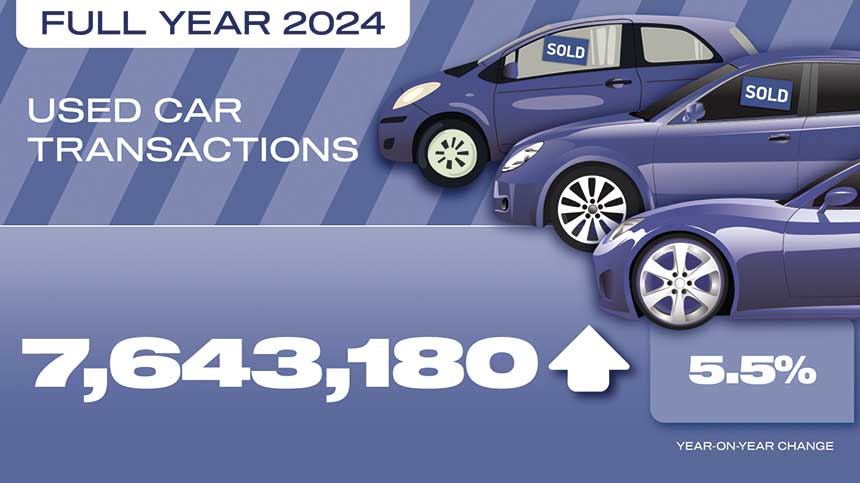SMMT reports used car market growth of 5.5% in 2024

Data from the Society of Motor Manufacturers and Traders (SMMT) has revealed used car market growth of 5.5% to 7,643,180 transactions in 2024.
Marking eight quarters of continuous growth, the year saw 400,488 more vehicles change hands than in 2023, with growth in the new car market fuelling availability and wider choice within the used sector.
Transactions rose in every month in 2024, as they did in 2023, with the fourth quarter up four per cent to 1,746,051 units.
The top three popular body types remained the same for another year, with superminis taking the top spot, accounting for one in three (32.3%) of all used cars sold in 2024. Lower medium held second place, with a 27.1% share of the market, and dual purpose vehicles made up 15.9% of sales.

When looking at fuel types, demand continued to soar for used battery electric cars (BEVs), with sales rising 57.4% to a record 188,382 units and achieving a new high for market share, at 2.5%. This is up from 1.7% in 2023 and 13 times larger than back in 2019.
Meanwhile, sales of plug-in hybrids (PHEVs) and hybrids (HEVs) also grew, up 32.2% to 92,120 units and 39.3% to 306,114 units respectively.
All told, the number of used electrified vehicles changing hands increased by 43.3% on 2023, with more than half a million of these ultra low or zero emission motors accounting for a 7.7% share of sales.
Sales by fuel type
Petrol and diesel powered cars accounted for 92.1% of all used car transactions – down slightly from 94.3% last year – with petrol up 6.8% to a 57.1% share of the market and diesel transactions dropping by 2.4% to account for 35% of all transactions.
Mike Hawes, SMMT chief executive, said: “The used car sector’s 25-month growth streak is good news for fleet renewal and for consumers benefitting from the greater choice filtering through from the new market.
“Record sales of second hand EVs also demonstrates strong appetite for these cutting-edge cars at lower price points. Ensuring ongoing growth, however, means maintaining that affordability, along with supply, which requires meaningful fiscal incentives to stimulate consumer demand for new EVs and removing the VED expensive car tax disincentive that risks dragging down used EV affordability for years to come.”








